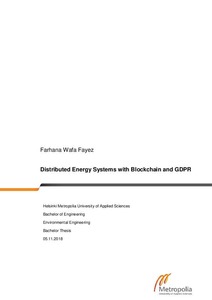Distributed Energy Systems with Blockchain and GDPR
Wafa Fayez, Farhana (2018)
Wafa Fayez, Farhana
Metropolia Ammattikorkeakoulu
2018
All rights reserved
Julkaisun pysyvä osoite on
https://urn.fi/URN:NBN:fi:amk-2018112618154
https://urn.fi/URN:NBN:fi:amk-2018112618154
Tiivistelmä
With varied renewable distributed energy resources, there needs to be a renewed and reformed energy accountability system, enabling ease in balanced distribution, trade, and consumer autonomy. This thesis focuses on potential use cases of blockchain technology and its adaptation in the energy sector, specifically focusing on the implementation of potential scalable energy microgrids onto the blockchain in order to enhance the energy grid industry.
This thesis also explains current energy accountability and distribution infrastructures in Finland, describing the involved entities and their core share of responsibilities in order to maintain the grid with adequate balance.
Discussions on different kind of blockchains and their appropriateness for this application and context are also included; however, much of the discussed topic is at its infancy stage of research in the energy industry, most of the motivation is focused on how distributed energy resources are appropriately valued and incentivised on a location and time variant basis via a blockchain based peer to peer microgrid.
Moreover, an overview of a few well known current worldwide industry prototype systems and their whitepapers have also been highlighted in this thesis. Plus, as we embark on discussing practical scaled implementations, it is crucial to put a spotlight on the legality and compliance of these form of systems in terms of European Union regulations and directives, assessing whether this technology would be GDPR compliant.
This thesis also explains current energy accountability and distribution infrastructures in Finland, describing the involved entities and their core share of responsibilities in order to maintain the grid with adequate balance.
Discussions on different kind of blockchains and their appropriateness for this application and context are also included; however, much of the discussed topic is at its infancy stage of research in the energy industry, most of the motivation is focused on how distributed energy resources are appropriately valued and incentivised on a location and time variant basis via a blockchain based peer to peer microgrid.
Moreover, an overview of a few well known current worldwide industry prototype systems and their whitepapers have also been highlighted in this thesis. Plus, as we embark on discussing practical scaled implementations, it is crucial to put a spotlight on the legality and compliance of these form of systems in terms of European Union regulations and directives, assessing whether this technology would be GDPR compliant.
